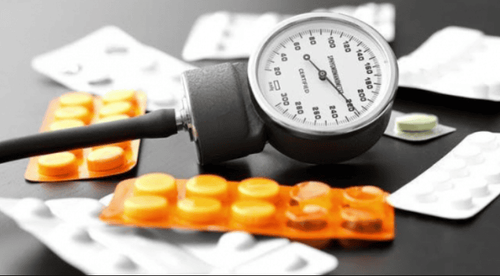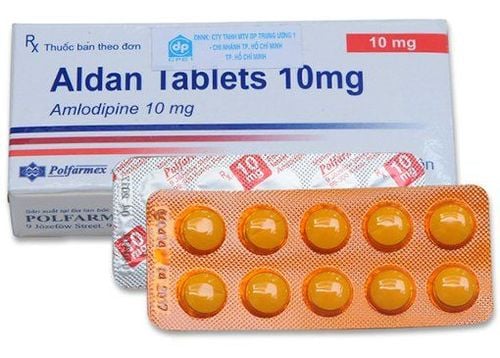This is an automatically translated article.
Hypertension is a chronic disease that can increase the risk of many major cardiovascular events. Amdirel is an antihypertensive drug of the calcium channel blocker group, used to control blood pressure and to support the treatment of stable coronary artery disease.
1. What does Amdirel do?
Amdirel medicine has the main active ingredient Amlodipine 5mg, prepared in tablet form. Amlodipine is a calcium ion antagonist and inhibits the influx of calcium ions into cardiac and smooth muscle cells. The antihypertensive mechanism of amlodipine is based on a direct relaxation of vascular smooth muscle. The exact mechanism by which amlodipine relieves angina has not been completely determined, but is primarily composed of two effects: Amlodipine dilates peripheral arterioles and thereby reduces peripheral resistance to vasoconstriction. heart beat. This afterload-reducing effect reduces myocardial energy consumption and oxygen demand; Amlodipine has also been implicated in dilation of the major coronary arteries and arterioles. This weakened coronary dilation increases myocardial oxygen delivery in patients with coronary artery spasm.
2. Indications and contraindications of the drug Amdirel
2.1. Indications Amdirel is indicated for use in the following cases:
Treatment of high blood pressure. May be used alone or in combination with other drugs. Treatment of stable angina and including vasospastic angina (Prinzmetal). 2.2. Contraindications Contraindicated to use Amdirel drug in the following cases:
Hypersensitivity to dihydropyridine, Amlodipine or to any component of the drug. Lower blood pressure. Heart failure with hemodynamic instability after acute myocardial infarction. Shock and even cardiogenic shock.
3. Dosage and how to take Amdirel
3.1. How to take Amdirel is to be taken orally, taking the tablet whole with water. This medicine should be taken at the same time each day to increase its effectiveness and ensure its effectiveness in maintaining blood pressure.
3.2. Dosage For hypertension and angina pectoris in adults: The usual starting dose is 5mg once daily, if after several weeks of treatment there is no improvement in blood pressure, the dose may be increased to the maximum dose. Maximum dose is 10 mg once daily depending on individual patient's tolerability and response. If the patient does not respond to hypotensive response to the given dose after 4 weeks, an additional antihypertensive drug can be added. If the patient is taking concomitant medications for high blood pressure such as diuretics, alpha-blockers, beta-blockers or ACE inhibitors, no dose adjustment is necessary. For angina, amlodipine can also be used as monotherapy or concomitantly with other antianginal agents. Elderly: The tolerability of the drug in the elderly and young people is almost equal. The usual adult dose is recommended for the elderly, but extreme caution should be exercised when increasing the dose. Patients with impaired liver function: Dosage should be chosen with caution and treatment should be started with the lowest effective dose. Patients with renal impairment : Use with usual dosage is recommended. Children: Take as directed by the doctor with the appropriate dose. 3.3. Overdosage
Current data indicate that overdosage (>100 mg Amlodipine) causes excessive peripheral vasodilatation, resulting in marked systemic hypotension and this effect may be prolonged. Symptomatic management of hypotension due to amlodipine overdose requires intensive cardiovascular support measures including regular monitoring of cardiac and respiratory function, elevation of extremities, monitoring of circulating fluid volume, and fluid intake. urine. If there are no contraindications, vasopressors can be used to restore blood pressure.
4. Amdirel side effects
Undesirable effects of amlodipine may include:
Common: The most common is ankle edema and other common symptoms include headache, dizziness, flushing; feeling hot, tired, weak; palpitations; cramp ; nausea, abdominal pain, indigestion; shortness of breath. Uncommon: Excessive hypotension, tachycardia, chest pain; rash, itching; muscle pain, joint pain; sleep disorders. Rare: Extrasystoles; profit increase; hives; increased liver enzymes (transaminases, alkaline phosphatase, lactate dehydrogenase); increased blood glucose; confusion; erythema multiforme. You may also experience other side effects while taking this medicine. Inform your doctor about any unwanted effects you experience while using the medicine.
5. Pay attention when taking Amdirel
Amdirel is used under the direction of a doctor, during the course of taking it, you must take it regularly to ensure that the drug is effective in lowering blood pressure according to the target. Do not change your dose without your doctor's consent. Avoid missing doses when taking this medicine because it can cause high blood pressure and increase the risk of complications of hypertension. It is recommended to wait for a fixed hour to take the medicine, usually in the morning. This drug should be used with caution in patients with reduced liver function, aortic stenosis, and heart failure after acute myocardial infarction. Pregnancy and breast-feeding: The drug has not been specifically studied in these populations. Therefore, do not use drugs for these two special subjects, should use drugs that have been fully researched.
6. Drug interactions
Possible drug interactions of Amdirel when taking the drug include:
Anesthetics when used concurrently increase the antihypertensive effect of amlodipine and may cause a more drastic decrease in blood pressure. There is a risk of excessive lowering of blood pressure when used, so before a procedure that requires anesthesia the patient should tell the doctor about the medication you are taking. Non-Steroidal Anti-Inflammatory Drugs: Current studies suggest that amlodipine is safe to be used with non-steroidal anti-inflammatory drugs, which may reduce the antihypertensive effects of amlodipine, especially indomethacin. Clarithromycin: This is a CYP3A4 inhibitor, the risk of hypotension is increased when the antibiotic clarithromycin is taken with amlodipine. Therefore, it is necessary to monitor the patient when amlodipine is used concomitantly with clarithromycin. Lithium: When used together with amlodipine, it can cause neurotoxicity, nausea, vomiting, and diarrhea. Estrogen: The hormone estrogen causes water retention, so it tends to increase blood pressure, reducing its antihypertensive effect. Sympathomimetics: Concomitant administration of amlodipine reduces the antihypertensive effect of amlodipine
7. Preservation of drugs
Store Amidirel in a cool, dry place, away from direct light and out of reach of children. Do not use if the medicine is damaged or expired.
Blood pressure control drugs are used to bring blood pressure to an optimal level. To verify this, patients need to monitor their blood pressure regularly while taking the drug. If you have any unusual symptoms while taking the drug, you should tell your doctor for advice.













